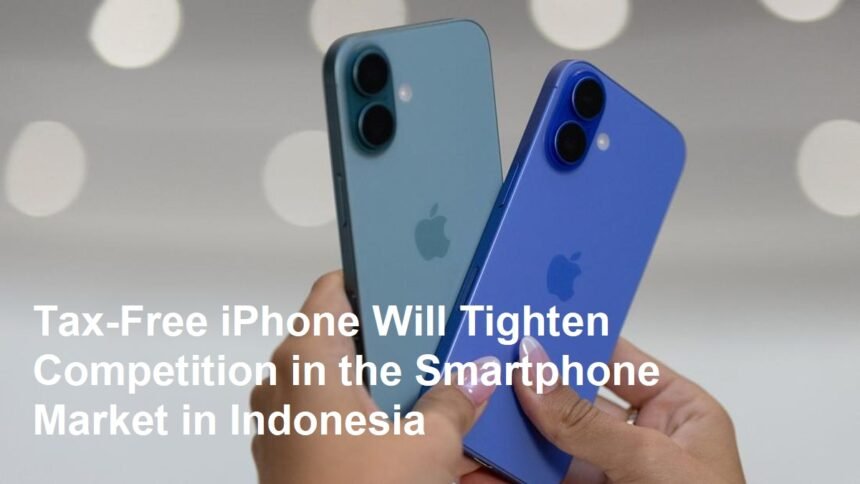Introducing
The Indonesian government recently announced a significant policy change: the exemption of import taxes on iPhones entering the country. This move aims to make iPhones more affordable for Indonesian consumers, but it also has far-reaching implications on the local smartphone industry and market competition. As the market braces for this shift, both consumers and manufacturers are set to experience notable changes in the near future.
Background of the Policy Change
Historically, imported smartphones, especially flagship models like the iPhone, have been subjected to various tariffs and taxes in Indonesia. These costs have kept prices relatively high compared to other countries, contributing to limited accessibility for many consumers. The government’s decision to remove import duties on iPhones is part of broader efforts to encourage market competition, attract more foreign investment, and provide consumers with more affordable and authentic high-end devices.
This policy not only reduces the retail price of iPhones but also aligns Indonesia more closely with neighboring countries where similar tax exemptions or reductions have been implemented. The goal is to boost consumer choice and support the country’s digital economy. However, this move also sparks debates about its impact on local smartphone brands and the overall market dynamics.
Impact on Consumer Choice and Market Prices
For consumers, the immediate benefit is clear: the potential for lower prices. With the removal of import taxes, iPhones are expected to become more accessible, appealing to a broader demographic. This price reduction could improve access to the latest Apple technology, fostering greater digital inclusion.
Additionally, a wider availability of genuine iPhones may reduce the market share of counterfeit or unofficial imports, enhancing user experience and device reliability. Consumers who previously hesitated due to high costs or fears of imitation may now consider upgrading to official, genuine products.
How Will This Affect Local Smartphone Brands?
The introduction of cheaper iPhones will intensify competition among local and international device manufacturers. Domestic brands such as Oppo, Vivo, Xiaomi, and Realme have established significant market shares by offering affordable, feature-rich smartphones tailored to Indonesian consumers’ needs. These brands have also invested heavily in local marketing, after-sales service, and innovation.
With iPhones now more competitively priced, local brands may face increased pressure to innovate, improve quality, and adjust their pricing strategies. To remain competitive, these companies might need to accelerate their product development cycles, offer more competitive pricing, or enhance additional services to retain customer loyalty.
This increased competition could ultimately benefit consumers, encouraging better features at more affordable prices across the entire market.
Potential Market Shifts and Business Strategies
Manufacturers and retailers are likely to adapt their strategies in response. For instance, local brands might focus more on offering mid-range devices with unique features or superior local after-sales services, differentiating themselves from the premium iPhone experience.
Meanwhile, Apple may also leverage this opportunity to expand its market share by increasing distribution channels, promotional activities, or offering financing options that make purchasing easier. Carriers might bundle iPhones with attractive plans, further boosting sales.
Additionally, the policy may encourage more local retail outlets to sell genuine iPhones, reducing the presence of grey-market imports and increasing official sales channels. This could lead to better warranty services, improved consumer protection, and overall confidence in the product.
Challenges and Considerations
Despite the positive outlook for consumers, there are some challenges. For small local vendors who relied on selling imported phones at a premium, this change might threaten their business models. Moreover, the influx of cheaper iPhones could lead to intense price wars, possibly affecting profit margins across the industry.
Another consideration is the potential impact on the government’s revenue. Reduced import taxes mean less income from tariffs, which might influence later policy decisions or budget allocations.
Final Thoughts
The decision to exempt import taxes on iPhones in Indonesia is poised to reshape the competitive landscape of the local smartphone industry. While consumers stand to benefit from more affordable, genuine Apple devices, local brands will need to innovate and adapt to this new environment to maintain their market positions.
Ultimately, increased competition tends to lead to better products, lower prices, and more choices for consumers. As Indonesia embraces this change, both companies and consumers must navigate the evolving market intelligently to maximize advantages and minimize challenges. The coming months will reveal how this policy shift influences Indonesia’s vibrant smartphone ecosystem.












